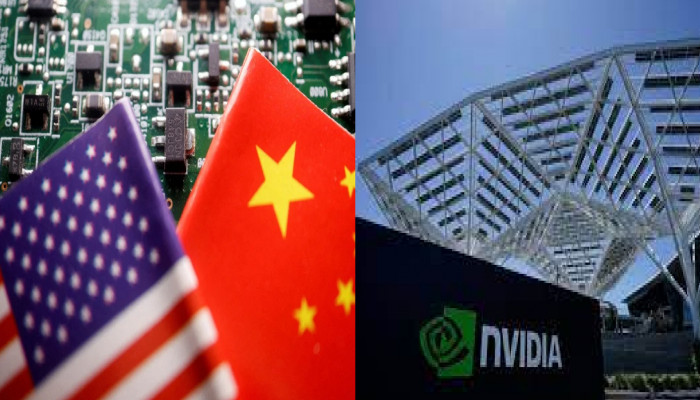US slaps export curbs on Nvidia AI chips for China, Russia
- In Reports
- 07:43 PM, Jan 13, 2025
- Myind Staff
The White House announced broad new restrictions on the sale of cutting-edge AI processors by Nvidia Corp. and its competitors, leaving it up to the Trump administration to determine whether and how to enact restrictions that have faced strong industry resistance.
The regulations, which will go into force in a year, will impose limits on the quantity of processing power that can be sold to a majority of nations. According to US authorities, companies operating in those areas can circumvent national borders by committing to a set of security and human rights requirements. Companies will have a 120-day period to submit comments, which is unusually long. This will give the Trump administration time to settle in and make changes to the rule after consulting with the industry and other countries, according to Commerce Secretary Gina Raimondo, who spoke to reporters before the release.
The Biden administration aimed to strike a balance between preserving national security and permitting the continuation of the chip trade, Raimondo emphasised. She noted that gaming chips and supply chain operations are not subject to the new restrictions. Additionally, Washington would forego licensing fees for academic institutions and research centres that purchase chips with low total processing power. “This is very hard, and no rule is perfect,” she said.
“Managing the national security risks requires delicate tradeoffs that take all of this into account.” China's growing strength in technology has raised concerns in the US. To limit China's access to AI chips used in data centres, the US is taking steps to restrict sales to both countries and companies. The aim is to focus AI development in friendly nations and encourage businesses worldwide to follow American standards. The Biden administration discussed these measures with future leaders, and one US official mentioned that export controls have largely been a bipartisan priority for national security.
Companies in the US and over 20 ally nations can agree to US government criteria and obtain authorisation to ship to the prohibited countries, much as the regulations for importing countries. To get approval, they will need to keep most of their computing power in countries that are friendly. The approval won't apply to data centres in China, Russia, Macau, and about 20 other locations that are under a US arms embargo. The US has basically banned shipments of AI chips to these places. The regulations aim to make sure that the global growth of AI adheres to American standards and depends on US technology rather than Chinese technology, a move that companies like Nvidia and Oracle Corp. have warned might have disastrous consequences for the US tech industry.
“It ensures that the infrastructure for training frontier AI, the most exquisite AI systems at the frontier, happens either in America or in the jurisdictions of our closest allies and that that capacity does not get offshored like chips and batteries and other industries that we’ve had to invest hundreds of billion dollars to bring back onshore,” National Security Advisor Jake Sullivan told reporters.
Companies and key lawmakers have warned that the restrictions might actually push customers to choose products from Chinese companies, like the blacklisted Huawei Technologies Co., if they can't buy their preferred American products or if the security requirements become too difficult to follow. Ned Finkle, vice president of government affairs at Nvidia, said in a statement that the Biden administration's rule "threatens to squander America's hard-won technological advantage" by "attempting to rig market outcomes and stifle competition."
“As the first Trump administration demonstrated, America wins through innovation, competition, and by sharing our technologies with the world — not by retreating behind a wall of government overreach,” Finkle said. Senators Ted Cruz, a Republican and Maria Cantwell, a Democrat, who are the leaders of the Commerce Committee, made this point in a letter to Raimondo in December. “Such draconian restrictions would severely hinder the sale of US technology abroad and risk driving foreign buyers to Chinese competitors like Huawei,” they wrote. Prior to the official release of the rule, Cruz stated in a statement last week that he would take into account "every tool," including the Congressional Review Act, to shield American business from "unnecessary overreach." The CRA gives Congress the power to revoke specific executive agency regulations.
Other lawmakers, including the bipartisan leaders of the House China Select Committee, support the Biden administration’s approach. Jimmy Goodrich, a senior adviser at RAND for technology analysis, stated that Chinese AI chips are not competitive on a global scale at the moment. “Due to export controls, China has been unable to produce a sufficient quantity of AI chips even for its own domestic demand, and even then, they are at least one to two generations inferior to American chips,” he said. The rules also introduce export controls on "closed model weights" for the first time. These controls manage how AI models handle data and produce responses and predictions.







Comments